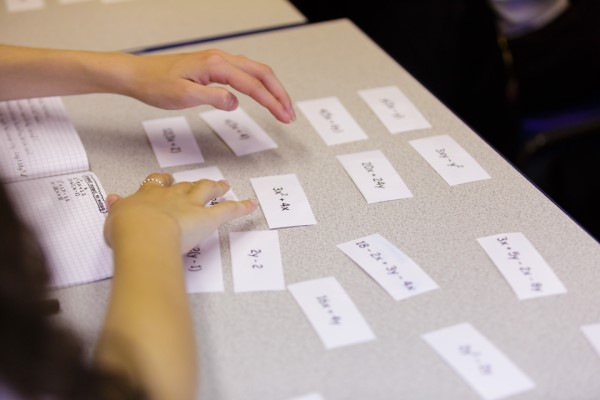Smoothing the KS2 to KS3 maths transition
Find out how one school harnessed the mastery approach used in its feeder schools to support new Year 7 students
24/04/2024

Starting secondary school can be a massive upheaval for students, and schools make enormous efforts to support transition. But secondary teachers of maths might well scratch their heads when it comes to the decline in attainment often observed in Year 7. Even those who achieved highly in Year 6 maths can struggle with the different approaches employed in the secondary maths classroom, with an even greater negative impact on middle and lower prior attainers. In this feature, we discover what one school is doing to support all its Year 7s to become confident mathematicians.
A focus on transition
Gavin Yates, Director of Maths at The Whitstable School in Kent and a Head of Department Advocate for Kent and Medway Maths Hub, was keen to address the transition issue. His initial motivation for engaging with his local hub four years ago was a focus on Years 7 and 8 and a desire to reduce the roll back in attainment often seen as children move up. He’d also noticed a different approach to maths in KS2, and visits to local feeder schools revealed that teachers were taking a mastery approach to maths; Gavin was intrigued by what he saw. Would taking a similar approach to maths in KS3 ease that transition for students and support them to hit the ground running?
A desire to develop his department’s knowledge of wider practices in maths was also a key driver, as well as the knowledge that The Whitstable School had reached a ‘ceiling’ in terms of grades at KS4. Gavin was keen to move his department away from more traditional strategies, improve the use of mathematical terminology in KS3, and gain a greater consistency of approach.
Support and best practice
Whitstable is now in its fourth year of teaching for mastery, engaging annually with the Sustaining element of the Teaching for Mastery Programme. The school has also engaged, alongside its local feeder primary schools, in the Years 5-8 Continuity Work Group to explore KS2 into KS3 best practice. Gavin has been so impressed with his experience of working with the Maths Hub, he has taken on the role of Head of Department Advocate, supporting other heads of department new to teaching for mastery.
“The CPD on offer from Maths Hubs is vital to aid development in a maths department. By getting into other schools and getting advice, you can make decisions about change that are based upon clear understanding and observations of best practice. You can observe what would and wouldn’t work in your own department.”
Once he was sure that teaching for mastery was the right approach for his department to take, Gavin elected to invest in the same commercial mastery scheme as The Whitstable School’s feeder schools, setting about to adapt it to fit with his school’s ‘house style’. The new scheme’s approaches, as well as the terminology, representations and manipulatives used, all looked comfortingly familiar to new Year 7 students. Engaging with a Teaching for Mastery Work Group ensured that Gavin’s team had the pedagogical understanding to teach the new scheme effectively and, following its successful implementation, he reports that progression in KS3 has been noticeable.
“The impact has been greater consistency of knowledge, terminology and a wider understanding of a range of approaches, for both students and staff. It has cemented a foundation of knowledge, built upon prior learning in KS2, that was not there before.”
Building on firm foundations
Perhaps the most unexpected impact, given the department’s focus on maths in KS3, is the improvement in mathematical thinking and problem solving observed in KS4. Happily, the benefits have impacted teachers as well as students; Gavin’s team, particularly ECTs, have benefitted from the collaborative planning and consistency of approach which are key features of teaching for mastery, with considerable improvements in teacher workload.
“Staff really appreciate the consistency and collaborative planning. There’s a better understanding of what good quality maths lessons look like. Having those underlying mastery principles, and talking about that in departmental meetings, is really helpful. Everybody’s reflected on what they do in KS4, from the perspective of what we’ve built in KS3; they are using a mastery approach in KS4, because they’ve tapped into what we’ve built lower down the school.
"Our GCSE results, which were broadly good before, have improved even further since teaching for mastery has been introduced. Though it remains to be seen whether the correlation between mastery and KS4 results is strong, we have just seen the strongest set of Year 9 results in the school's history!”
Smooth Year 7 transition in your school
Contact your local Maths Hub to discuss the different projects available that focus on Year 7.
